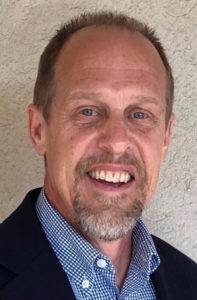Emotions are not our faith. Our faith is our faith. Yet, emotions are powerful forces in faith communities, especially in one whose primary metaphor is “body.” We are at our best when we are one body, the body of Christ, the manifestation of Christ’s presence in flesh and blood, no less.
We didn’t invent this audacious and bold identity for ourselves. Christ himself called us into being, naming us “body of Christ.” God’s work of salvation through Christ gave birth to this body, gathering us around the inspiring and challenging way of Jesus. This is our faith story, initiated by Christ and empowered by the Holy Spirit.

Mark Tidsworth
So when it comes to emotions, we are not surprised that such an intimate expression of community shares moods and emotional states. Although our churches are currently separated by physical space, we retain our remarkable ability to influence the emotional lives of one another.
And although God’s church has experienced the sharing of emotional states for centuries, contemporary social science, informed by physiological research into mirror neurons, recognizes the power of emotional contagion.
As Janice R. Kelly and Sigal Barsade have written: “The more cohesive the group, the stronger the sharing of moods, emotional history, and even hot buttons.”
So the closer our sense of fellowship and community as churches, the more likely we are to share and influence the emotional states of one another. This is not a judgment, an evaluation assigning positive or negative values. This is simply a description of the way we function in the body of Christ. Our experience, plus research from various fields, tell us that we powerfully influence each other simply by being church together.
The pastoral and lay leaders among us intuitively know their emotional responses during times of crisis are super-sized, exceptionally influential.
Daniel Goleman, Richard Boyatzis and Annie McKee have written: “In such a grave crisis, all eyes turn to the leader for emotional guidance. Because the leader’s way of seeing things has special weight, leaders manage meaning for a group, offering a way to interpret or make sense of, and so react emotionally to, a given situation.”
Clearly, leadership matters; especially in this intricately interconnected body of Christ.
“Perhaps now is the time to stop, step back and breathe deeply.”
So now that the first wave of this crisis is over; now that we have reinvented nearly everything in how we are church, perhaps now is the time to stop, step back and breathe deeply. Perhaps now is the time for pastoral and lay leaders to step off the front lines for a moment and look to ourselves.
No, stepping back is not only about self-preservation during an ongoing and unfolding crisis. Stepping back and reconnecting with the one who can reset our emotional barometers is a spiritual discipline that directly influences the emotional states of our churches.
Again quoting Goleman, Boyatzis and McKee: “Because emotions are so contagious — especially from leaders to others in the group — leaders’ first tasks are the emotional equivalent of good hygiene: getting their own emotions in hand. Quite simply, leaders cannot effectively manage emotions in anyone else without first handling their own. How a leader feels thus becomes more than just a private matter; given the reality of emotional leakage, a leader’s emotions have public consequences.”
Once we know this, the powerful influence of leadership regarding emotional contagion, we cannot unknow it. We must use this understanding of our kind for the good of God’s church.
“Pastoral and lay leaders, get yourself to a good place.”
So pastoral and lay leaders, get yourself to a good place. Look to our Lord. Step back, breathe, look upward, settle. Invite God’s full presence into every part of your being. Cast your anxiety and care on God, for God cares for you. Ask the Holy Spirit to fill you, pushing away the toxicity and fear, replacing them with health and peace.
Trust God to do this, for God is able and faithful. In fact, this is the very kind of time for which God has been preparing you. God has and shall give you everything you need for the living of these days, for the doing of God’s will.
Then let’s use our understanding of emotional contagion to spread a really good virus among our people. Perhaps we will call it the Coronavirus Compassion Contagion. Or maybe we will share the Trinity Treatment of faith, hope and love.
Mark Tidsworth is founder and team leader for Pinnacle Leadership Associates. He has served as a pastor, new church developer, interim pastor, renewal pastor, therapist, nonprofit director, business owner, leadership coach, congregational consultant, leadership trainer and author. Ordained in the Baptist tradition, Mark is an ecumenical Christian minister based in Chapin, S.C.


